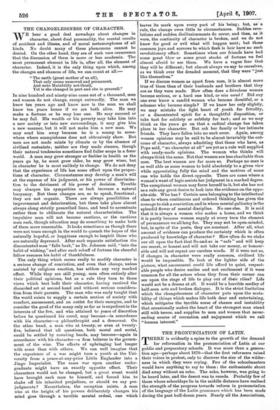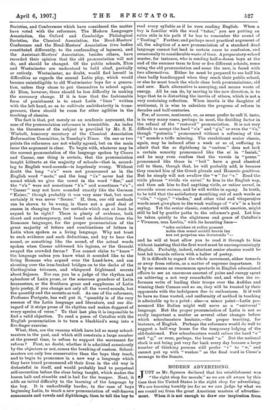THE PRONUNCIATION OF LATIN.
THERE is evidently a spine to the growth of the demand for reformation in the pronunciation of Latin at our public and preparatory schools. It was more than a genera- tion ago—perhaps about 1870—that the first reformers raised their voices in protest, only to discover the size of the wilder- ness in which they were crying. Few of the schoolmasters would have anything to say to them the enthusiastic shout died away without an echo. The echo, however, was going to be heard later, and the desert was to recede. Probably few of those whose schooldays lie in the middle distance have realised the strength of the progress towards reform in pronunciation of the language of the Latin grammars which has been made during the past half-dozen years. Nearly all the Associations, Societies, and Conferences which have considered the matter have voted with the reformers. The Modern Languages Association, the Oxford and Cambridge Philological Societies, the Classical Association, the Head-Masters' Conference and the Head-Masters' Association (two bodies constituted differently, to the confounding of laymen), and the Aisistant-Masters' Association, besides others, have recorded their opinion that the old pronunciation will not do, and should be changed. Of the public schools, Eton and Westminster are understood to hold aloof, partially or entirely. Westminster, no doubt, would find herself in difficulties as regards the annual Latin play, which would become unintelligible to old Westminster boys for a genera- tion, unless they chose to put themselves to school again, At Eton, however, there should be less difficulty in making the necessary change. If it is true that the fashionable form of punishment is to exact Latin "lines" written with the left hand, so as to cultivate ambidexterity in trans- gressors, there should be room for other agilities in the teaching of classics. The fact is that, put merely as an academic argument, the case of the pronunciation reformers is irresistible. An index to the literature of the subject is provided by Mr. S. E. Winholt, honorary secretary of the Classical Association Reformation Committee, in Tuesday's Times. On one or two points the reformers are not wholly agreed, but on the main issue the argument is clear. To begin with, whatever may be the correct pronunciation of the language spoken by Cicero and Caesar, one thing is certain, that the, pronunciation taught hitherto at the majority of schools—that is, accord- ing to English word-sounds—is hopelessly wrong. Without doubt the long " a's" were not pronounced as in the English word "mate," and the long "i's" never had the sound which we give the vowel in the word "fine," and the "es" were not sometimes " k's " and sometimes "s's" ; " Caesar " may not have sounded exactly like the German "Kaiser," though probably it was very near that, but most certainly it was never "Seezer." If, then, our old methods can be shown to be wrong, is there not a good deal of reason in changing them for methods which can at least be argued to be right? There is plenty of evidence, both direct and contemporary, and based on deduction from the Romance languages, for the proper pronunciation of the great majority of letters and combinations of letters in Latin when spoken as a living language. Why not trust to such evidence and such deductions, and try to bear the sound, or something like the sound, of the actual words spoken when Caesar addressed his legions, or the Gracchi swayed the crowded forum? Yon cannot claim to " know " the language unless you know what it sounded like to the living Romans who argued over the Land-laws, and ran shouting over the iron-beaked bridges on to the decks of the Carthaginian triremes, and whispered frightened secrets about Sejanns. Nor can you be a judge of the rhythm and splendour of Latin prose, or the sonorous grandeur of Latin hexameters, or the Southern grace and suppleness of Latin lyric poetry, if you change not only all the vowel-sounds, but the quantity and the accents as well. As one of the reformers, Professor Postgate, has well put it, "quantity is of the very essence of the Latin language and literature, and our dis- regard of it strips prose of its rhythm and makes doggerel of every species of verse." To that last plea it is impossible to find a valid objection. To read a poem of Catullus with the English pronunciation is to turn a blackbird's song into a five-finger exercise. What, then, are the reasons which have led so many school- masters in the past, and which still constrain a large number at the present time, to refuse to support the movement for reform ? First, no doubt, whether it is admitted consciously by the objectors or not, comes the breaking of custom. School- masters are only less conservative than the boys they teack and to begin to pronounce in a new way a language which they have beard pronounced all their lives in the old way is distasteful in itself, and would probably lead to perpetual self-correction before the class being taught, which makes the lesson halt and stumble and is bad for the temper. Next, it adds an initial difficulty to the learning of the language by the boy. It is lindoebtedly harder, in the • case of boys beginning Latin, to teach a new pronunciation of well-known consonants and vowels and diphthongs, than to tell the boy to read every syllable as if he were reading English. When a boy is familiar with the word "tutor," you are putting an extra stile in his path if he has to remember the sound of " Tooting." Further, and perhaps most practical argument of all, the adoption of a new pronunciation of a standard dead language cannot but lead in certain cases to confusion, and occasionally to considerable waste of time. Apreparatory-school master, for instance, who is sending half-a-dozen boys at the end of the summer term to four or five different schools, some using the old pronunciation and some the new, is faced with two alternatives. Either he must be prepared to see half his class badly handicapped when they reach their public school, or else he must teach the whole class both pronunciations, old and new. Each alternative is annoying, and means waste of energy. All be can do, by moving in the new direction, is to hope that be is disturbing the inertia of others, which is not a very sustaining reflection. When inertia is the daughter of sentiment, it is wise to calculate the progress of reform in decades and half-centuries.
For, of course, sentiment, or, as some prefer to call it, taste, is in very many cases, perhaps in most, the deciding factor in the refusal of the "restored" pronunciation. It is not very difficult to accept the hard " c's " and "g's," or even the " Vs," though " potentia " pronounced without a softening of the "t" sounds a trifle mincing. The recalcitrant senior classic, again, may be induced after a week or so of suffering to admit that the ae diphthong in " caelum" does not lack a certain sonority pronounced like the ai in "Isaiah," and he may even confess that the vowels in "poem" pronounced like those in " boil " have a good classical roll to them, though that, he will probably add, is because they remind him of the Greek plurals and Homeric genitives. But he simply will not swallow the " w" for "v." Read the virile phrase " vivida vie animi" to him in the English way, and then ask him to find anything virile, or rather wereel, in weewida weese animee, and he will writhe in agony. In truth, to be told that the satisfactory mouthing out of such words as " vilis," "vigor," " vindex," and other vital and vitupera4ive words must give place to the weak wailings of " w's " is a hard saying. Yet the senior classic, contorted with emotion, might still be led by gentler paths to the reformer's goal. Let him be taken quietly to the slightness and grace of Catellus'a " Vivamus, men Lesbia," with its haunting lines—
"soles oceidere at redire peanut noble dbm semel occidit bravis lax nox est perpetus una dormienda "-
and he will at least allow you to read it through to him without insisting that the first word must be uncompromisingly English. Probably, indeed, reluctant senior classics would be beet led towards reform with a halter of poetry. It is difficult to regard the whole movement, either towards or away from reform, as a matter of supreme importance. It is by no means an uncommon spectacle in English educational affairs to see an enormous amount of pains and energy spent on achieving a not very remarkable end, and when the re- formers write of leading their troops over the Aufidus and winning their Cannae and so on, they will be treated by their opponents with the indulgence due to enthusiasm. It id well to have no time wasted, and uniformity of method in teaching is admirable up to a point: also—a minor point—Latin pro- nounced like Italian might well serve as a "universal" language. But the proper pronunciation of Latin is not so really important a matter as several other changes before which schoolmasters hesitate,—the proper teaching, for instance, of English. Perhaps the reformers would do well to suggest a half-way house for the temporary lodging of the old-fashioned. Few schoolmasters would refuse the hard " c " and "g," or even, perhaps, the broad "a." But the national clock is not being put very far back every day because a large number of thinking persons still prefer " v " to " w," and cannot put up with " weekee " as the final word in Ctesar's message to the Senate.











































 Previous page
Previous page